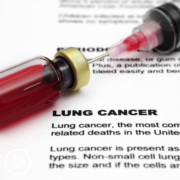How Can Specific Biomarkers Impact Lung Cancer Progression?
How Can Specific Biomarkers Impact Lung Cancer Progression? from Patient Empowerment Network on Vimeo.
Lung cancer progression can be aided by monitoring of biomarkers, but what do they indicate? Expert Dr. Christian Rolfo from Mount Sinai explains biomarker characteristics that help monitor disease progression and how clinical trials help in treatment advances.
See More from Best Lung Cancer Care
Related Resource:

|

|

|
Transcript:
Dr. Nicole Rochester:
So with regard to the biomarkers, you mentioned that these are kind of unevenly distributed among different populations depending on your origin, and so how does that play into the progression of the disease, what do we know about why patients with specific biomarkers have a different degree of disease progression?
Dr. Christian Rolfo:
Yeah, so we know more or less that the characteristics, I mean more or less in terms of the evolution of the clinical characteristics of these patients, in terms of organ affection in case of progression, but what is most important of this is that we are able to continue to identify, and I say monitoring these patients with liquid biopsy, for example, this is a good tool to understand or to understand it a bit better, which kind of mechanistic involvement.
So because we have, for example, patients who were receiving the case that I was discussing before EGFR mutations and they received one graft from the very beginning, a third-generation TKI is the one that is approved for the first line, and this patient has a progression. The possibility to have a mechanism of resistance is different, so we can have mutations that are coming in the same pathway, so in the same area, same kind of mutation, but different location, just to the people understand is the kind of line and we have the mutation that is here, the one that we are attacking, but we have another mutation that is in this area, and it’s not covered by the track that is covering this mutation.
So we have nowadays drugs that are going to, in this area in clinical trials, or we have in other cases other areas of the task of mutations that have nothing to do with the original one. So we are activating another kind of pathway, or we are transforming the tumor from one kind of tumor to another kind of tumor, so for this reason, identify which kind of mechanism of resistance is in place can have an important or have important implications for how we are treating these patients, so we need to look at that to treat the patients.
Dr. Nicole Rochester: Wonderful. And speaking of resistance, we know that there are some patients who end up trying multiple therapies in order to treat their lung cancer, are there alternative treatment strategies for lung cancer patients who have failed all therapies?
Dr. Christian Rolfo:
Yeah, absolutely, we have research in lung cancer is never stopping in oncology generally, but in lung cancer it’s really exciting to see how this research is evolving, and it’s arriving to the patients the meaning of the research when we are doing access to the patients, to the discovery of the finding that we have, and obviously, we have strategies in the clinical practice, but also we have the clinical trials. So clinical trials, and that is something we need to try to define very well because some patients believe that when we are going to clinical trials there are no more options or we don’t have any other options to do.
We are sometimes using clinical trials even in the first line, so even in patients that are for the first time being treated. Because we know that some of the cases we are treating patients with from some standard of care and using drugs on top, we want to explore it, we can improve these outcomes that we already know. That could be also a clinical trial, that is also a clinical trial. So don’t take the participation in a clinical trial as the last option that you have, sometimes you will go to your doctor and the first time that you see a doctor for your first diagnosis, they can propose a clinical trial.
And this is really valuable. What we really appreciate is the collaboration of the patients to be in clinical trials, because we need to remember that the drugs that we are using today were analyzing other patients before, so the treatment that you are receiving in a standard of care today were before a clinical trial, it’s really important how we can interact with the research and the clinical practice very easily, so we have also some options that are…for what we call early drug development, that there are some drugs that are in patients who are receiving the standard of care, and they have the opportunity to be treated in new drugs, and you can discuss…believe me there, and
I know that there is a lot of questions about clinical trials but the clinical trial setting is really restrictive, it’s very well-coordinated, so you would be part of a very coordinated and structured things that they try to protect the patients in the first instance, and try to understand also how we can help the patients and the future generations. So that is really why we appreciate patients that the contribution of patients that are giving to this clinical research because it’s helping to advance the knowledge for the new patients as well.
Dr. Nicole Rochester:
And I really appreciate how you described clinical trials, and particularly your distinction about it’s not always this last ditch effort that sometimes you all are using clinical trials as first-line therapy. One of the common things is that clinical trials are tomorrow’s medicine today, and helping patients and families to understand that there’s value in being involved in clinical trials and that…and I think with COVID there’s a little more understanding, but certainly, we have a long way to go, and so I appreciate you sharing that. Do you have any specific examples of patients in your practice, and not names, of course, but examples of…that have benefited from clinical trials?
Dr. Christian Rolfo:
Absolutely, we have several of examples, and actually FDA was doing a terrific job in the last year to try to get access quickly access to the drugs for patients, and some of this access that was granted was based in clinical trials that we’re starting for a Phase I or Phase II trials, owe are really doing a very rapid evolution of the drug development, and this is a revolution actually of the drug development because we have access very quickly. I can tell you that it was certainly in my career, several patients in clinical trials that they got benefits. Obviously, clinical trials are answering questions, so that is the way that we can answer questions scientifically and is the only way that we can advance in clinical therapeutics.





